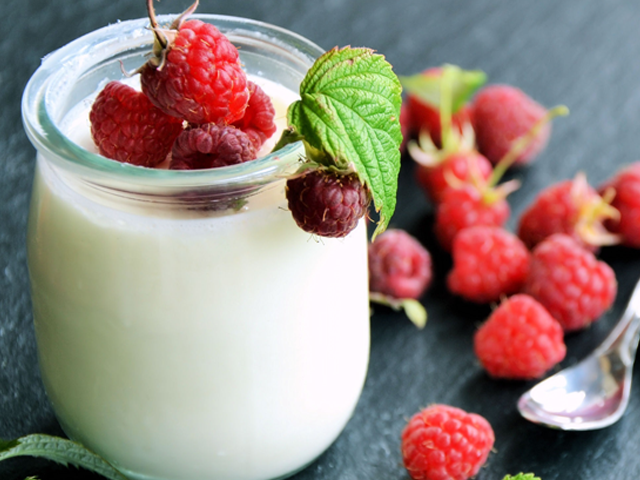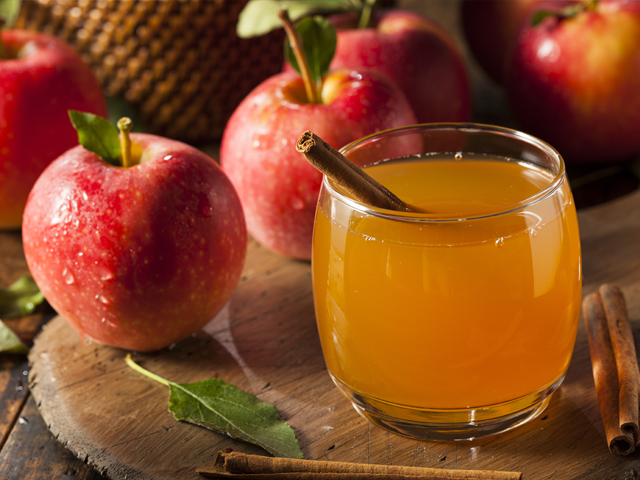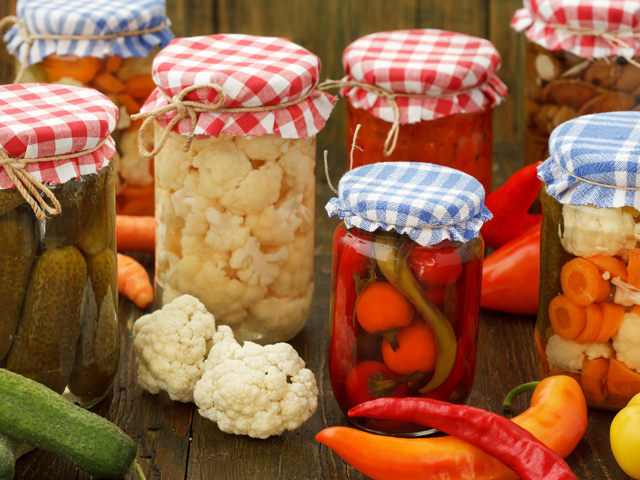Eat Probiotic Foods for a Healthy Gut
Yogurt, apple cider vinegar and all fermented foods have one, very important thing in common: they all have probiotic properties.
What are probiotic foods?
They are foods that contain live and active bacterial cultures, ie. “good” bacteria, which survive in the gut and prevent harmful bacteria and toxins from being absorbed into the body from the gut. [1]
This makes them vital in maintaining healthy bodily functions and protecting the body from many ailments and chronic diseases.
Probiotic foods also undergo the process of fermentation, which has the added benefit of making the food easier to digest.
During fermentation, carbohydrates in the food, which can cause digestive problems, are broken down into acids by various kinds of probiotic bacteria or yeast.
For example, the lactose in yoghurt is broken down into lactic acid. [2]
Fermented foods have been around for thousands of years, as it was one of the few ways to preserve foods in a time before refrigeration and modern medicine.
Even then, their health-promoting properties and importance in maintaining gut health was well-known.
However there is a caveat to everything just said which will be revealed towards the end of this blog.
Over the course of the last century however, fermented foods have been neglected in favour of pasteurization, a process that strips food of the live bacteria the gut needs to stay in balance.
So it’s great to see more and more interest in probiotic foods in recent years, as people again become aware of their numerous health benefits.
Bone broth isn’t a probiotic but it’s another great way to possibly heal an unhealthy Gut!
Health Benefits of Probiotic Foods
Why are these good bacteria so beneficial to our health?
Studies show that around 70% of your immune system is in your gut.
If bad bacteria and toxins take over and outnumber the good bacteria, the immune system is weakened making the body vulnerable to disease-triggering inflammation, as well as problems with digestion, cognitive function, the joints and the skin. [3]
A daily intake of probiotics can
- Boost Immunity
- Reduce risk of colorectal cancer
- Reduce risk of type 2 diabetes
- Reduce high blood pressure
- Help heal Inflammatory Bowel Disease
- Help treat brain-related diseases
- Build Bone Density
- Fight Allergies
- Improve Digestion
- Kill Candida-yeast infections
What kills off good bacteria and causes this imbalance?
Well basically anything toxic and most medications, such as antibiotics, over-the-counter medications, chemo- and radiotherapy, tobacco, alcohol, virtually all non-organic meat, chicken and dairy, because they’re loaded with antibiotics, and particularly fast/ processed food.
Aging also contributes to the decline of good gut bacteria. [4]
The Best Probiotic Foods
The only way forward is to keep your body topped up with a regular supply of good bacteria, by eating foods which are natural probiotics, such as probiotic yoghurt, femented foods and apple cider vinegar.
Probiotic Yoghurt
Originally, probiotic yogurt was made by fermenting milk, either sheep’s or cow’s, into the creamy food we all know and love.
Nowadays, dairy milks are usually pasteurized first, ie. heated to high temperatures in order to kill the existing bacteria.
A culture of live bacteria is then added and the milk is allowed to rest for several hours until it thickens, indicating that fermentation has taken place. [5]
As well as being packed with probiotics, this type of yoghurt is also rich in protein, fats, carbohydrates, minerals, vitamins, enzymes and also omega-3 fatty acids.
Organic varieties, that is made from the milk of cows or goats fed solely on grass, provide a much greater amount of nutrients. [6]

Though not technically yogurt, Kefir—a creamy, slightly sour drink, made by fermenting milk with kefir grains comprised of yeast and gut-friendly bacteria.
It is rich in protein, calcium, B vitamins, and even more probiotics than yogurt.
When buying yogurt, make sure the label states it’s organic or better still bio-dynamic and that it contains “live culture”, otherwise it is probably not probiotic and doesn’t contain the beneficial bacteria.
Most yogurt sold in Australia is live.
Here is a list of the best ones on the market according to our team:
- Dairy Farmers Bornhoffen.
- Tamar Valley Greek Style (per 100g serve): 542kJ, 5.3g protein, 9.8g fat, 5.2g sugars, 160mg calcium.
- Five am Organic Natural -no added sugar (per 100g serve): 322kJ, 4.8g protein, 4.5g fat, 6g sugars, 144mg calcium.
- Barambah Organics Low Fat Natural Yoghurt
- Black Swan Vanilla Bean Greek Style Natural (Per 100g) 410kJ / 7.7g protein / 13g carbs/ 6.5g sugars / 1.5g fat / 233mg calcium
- Chobani Blueberry Authentic Strained Yoghurt (per 100g): 332kJ, 8g protein, 0.2g fat, 9.8g sugars, 104mg calcium
- Farmer’s Union Natural Pot Set (per 100g serve): 306kJ, 4.6g protein, 3.2g fat (2.1g saturated fat), 6.5g sugars, 166mg calcium. [8]
- Jalna – Bio Dynamic Yogurt
Other Fermented Foods
You can also get a large dose of probiotics from other fermented foods such as
- sauerkraut-fermented cabbage. (Click here to find out how to make sauerkraut)
- pickles
- kombucha-made from tea, clean water, sugar, yeast, and bacteria
- kimchi- spicy Asian fermented cabbage, similar to sauerkraut
- tempeh- made from soybeans and yeast, from Indonesia
- Lassi- made by combining yogurt and milk (or water), from India [9]
Organic Apple Cider Vinegar
As far back as 400 B.C. the great Hippocrates, Father of Medicine, spoke of apple cider vinegar health benefits, and it was used by the ancient Greeks and Romans.
Strictly speaking, apple cider vinegar is not a probiotic.
It is often confused with probiotics because it encourages the growth of probiotics, or good bacteria.
Its two most beneficial ingredients are pectin and acetic acid.
The key ingredient in raw, unfiltered apple cider vinegar is fermented apples, which contain the carbohydrate pectin.
It is the pectin that promotes the growth of good bacteria, and it is sometimes referred to as a natural prebiotic.
Pectin binds to harmful bacteria and other toxins in the gut and removes them from the body in faeces, leaving the probiotics to continue protecting the gut. [10]
Vinegar is made in a two-step process.
Firstly, yeast is added to the crushed apples, which ferments the sugars and turn them into alcohol.
Then, bacteria are added to the alcohol solution, which further ferment the alcohol and turn it into acetic acid, the main active compound in vinegar which kills harmful bacteria, preserves and disinfects.

Organic, unfiltered apple cider vinegar also contains what is known as mother: strands of proteins, enzymes and friendly bacteria that give the product a murky, cobweb-like appearance. Apple cider vinegar with mother is said to have the most health benefits.
The most important benefits of organic apple cider vinegar / fermented vinegar’s are the following:
- Lowers blood sugar levels and fights diabetes
- Lowers cholesterol and reduces risk of heart disease in animal studies
- Kills many types of bacteria including E coli, making it a good preservative and disinfectant
- May Protect against Cancer
- Helps weight loss
- May help in reducing surface thread veins [11]
- A remedy for dandruff and acne.
Apple cider vinegar uses also include its cleaning properties.
It is an effective window cleaner, and it can remove limescale deposits from kitchen appliances such as kettles, as well as from sinks and taps.
Perhaps the most famous apple cider vinegar is made by Bragg’s. Bragg’s Organic Raw Apple Cider Vinegar is made from organically certified apples.
It is unfiltered, unpasteurized, kosher-certified and contains the mother of vinegar.
It is certified in accordance with USDA organic standards.
Manufacturers and thousands of consumers claim Bragg’s is the best apple cider vinegar, as it is also used as a chemical-free shampoo, a facial tonic, for sore throats, on sunburn and to reduce swelling of hands and feet. [12]
Here’s the caveat mentioned earlier.
If you find you cannot eat any one or all of these foods it may mean you are a histamine reactor.
Therefore please avoid these foods until your gut health improves and you have moved the accumulated histamine out of your body.
Would you like to find out more?
Until next time,
Yours in Health
From the Team at Unique Health and Wellness
Disclaimer: The information provided does not take into account individual needs of any particular person. When providing this information it is intended as a sharing of knowledge and information from the research. The information provided should not be construed as personal medical advice or instruction and is not intended to replace a one-on-one relationship with a qualified health care professional and is not intended as medical advice. We encourage you to make your own health care decisions based upon your research and in partnership with a qualified health care professional.
References:
[1] paleoleap.com/eat-probiotic-foods/
[2] livestrong/1011208-7-surprising-benefits-fermented-food
[3] bewell.com/blog/7-things-you-need-to-know-about-fermented-foods
[4] bewell.com/blog/probiotic-power
[5] womenshealthmag.com/food/the-best-yogurt-for-you
[6] sciencedirect.com/science/article/pii/S0958694605000142
[7] smh.com.au/lifestyle/diet-and-fitness/which-yoghurt-is-best-20140710-zt22p.html
[8] news.com.au/lifestyle/food/eat/yoghurt–a-health-food-or-a-dairy-dessert/news-story/97a655f6036f2936d0c06e4e5b687f9a
[9] globalhealingcenter.com/natural-health/the-9-best-fermented-foods-for-your-gut/
[10] livestrong.com/article/508833-is-apple-cider-vinegar-a-probiotic
[11] authoritynutrition.com/6-proven-health-benefits-of-apple-cider-vinegar
[12] globalhealingcenter.com/bragg-apple-cider-vinegar.html


MORE BLOG STORIES
Breaking Down the B Vitamins
Amazing Ways to Help Heal Mitochondrial Dysfunction!
The 5 Worst Foods For Your Gut
‘THE GOLDEN GODDESS’
Mitochondria, Inflammation and Oxidative Stress
Tired? You May Be Suffering From Mitochondrial Dysfunction